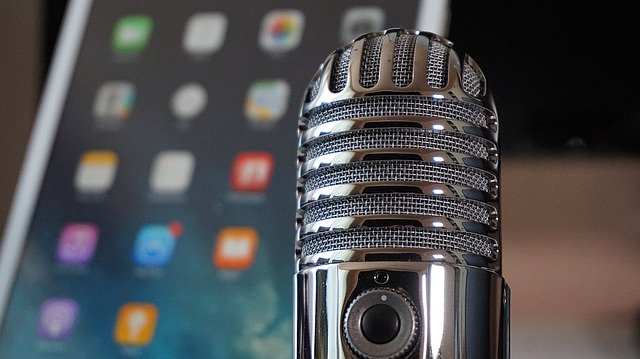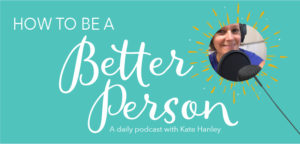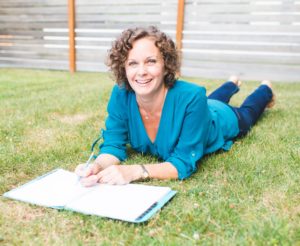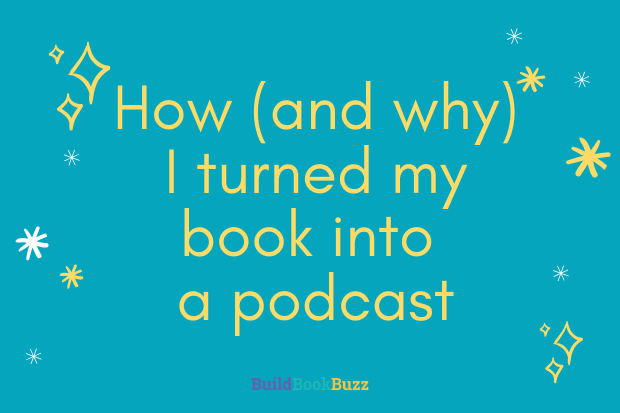How (and why) I turned my book into a podcast
My friend Kate Hanley, one of my favorite freelance writers, is the author of the book How to Be a Better Person (that’s an Amazon Associates link) and the host of the new podcast of the same name. In this post she shares her experience with turning her book into a podcast—the good, the “meh,” the hard, and the easy. (Kate also wrote, “How I use Instagram to sell more books” and “5 most common obstacles to writing your book” for us.)
How (and why) I turned my book into a podcast
By Kate Hanley
My book, How to Be a Better Person, was released in January, 2018. Sales eventually quieted down, and I lost my promotion mojo. I also was very busy with client ghostwriting and other projects, which is great for my bank account, but not so great for my creativity.
I knew I needed something to keep both my book and me “out there,” but I didn’t have any ideas for a new book.
Then a fated conversation with a friend about how the 401 tips in my book would make great (and short) podcast episodes set my wheels turning.
Just a few months after that conversation at the May 2019 American Society for Journalists and Authors conference, I launched the podcast on September 23, 2019.
Here are my takeaways thus far.
My goals for starting a podcast
When I launched the “How to Be a Better Person” podcast, I wanted to:
- Build my audience. I know I want to write more books, but with the majority of my mindshare going to client work, I don’t have ideas. Until the muse visits again, I want to grow a demonstrable audience and develop a deeper relationship with listeners.
- Put myself out there as an expert in a new way. Lots of people have written a book. Lots of people have started podcasts. Fewer have done both.
I hope to raise my profile in such a way that I will open myself up to bigger opportunities—as a columnist, a speaker, or something I can’t yet foresee. In addition to providing new revenue streams, having a higher profile will serve me well when my next book idea comes along.
- Have a personal project I love doing. I love working for clients. But I also know I need something that’s mine to get excited about to really feel fulfilled. I have always loved the audio format, ever since hosting a radio show in college. Being in a quiet room, alone, wearing headphones, and talking to an imaginary listener really does it for me!
- Monetize . . . some day. Of course, I do have fantasies/goals of monetizing the podcast, but I felt it was important to build an audience first. As soon as I get through the first 100 episodes, I will seek sponsors; ask for individual supporters through Patreon; or develop a paid program.
The nuts and bolts
Once I had my goals articulated, it was time to go into creation mode—my favorite part! Here’s what that involved.
1. Deciding the format.
Now that the podcast market has exploded—there are more interview and richly produced investigative podcasts than you can shake a stick at—I wanted to differentiate myself somehow.
My book’s format leant itself nicely to a short (five minutes or less), daily format. I started offering seven episodes per week. After getting feedback from listeners, examining my listening rates, and doing a reality check with my own busy schedule, I dialed that back to five episodes a week.
2. Writing.
This has been harder than I anticipated because I didn’t understand how different it is to write for a podcast. The writing in my book is really spare. A podcast is much more conversational.
I don’t yet feel comfortable just making some notes and riffing—when I have tried it, it has necessitated more audio editing which is either time-consuming if you’re doing it yourself or more expensive if you’re hiring someone to do it for you.
So, while I am getting faster and less fussy at writing the scripts, it still takes me about 30 minutes to write and record each episode.
3. Recording.
This piece has been much easier than I expected: A co-working space where I live opened a fully outfitted podcast recording studio that is affordable to rent.
That meant I didn’t have to spend any time figuring out which microphone to buy; I didn’t have to struggle to find a (nonexistent) sound-proof place in my house.

The results
Naturally, I’ve been watching for something to happen, looking for results that indicate whether creating a podcast made business sense for me or not. There have been a few surprises so far.
- Downloads. Six weeks in, I’ve just hit 10,000 downloads. I am thrilled with these numbers even as I look forward to them growing. I think the short format encourages folks to listen to multiple episodes whenever they first discover the podcast, which keeps these numbers high.
- Book sales. Surprisingly, the podcast hasn’t yet positively impacted book sales. In fact, according to the Book Scan data I have access to via Author Central on Amazon, the book is selling about 25 percent fewer copies per week since I launched the podcast (they went from the mid-20s to the high teens).
Perhaps this is because folks think they don’t need the book since they can get daily content for free on the podcast. Or perhaps it just hasn’t been long enough to see an effect. Still, it gives me another outlet to promote the book as a holiday gift (and, later, as a graduation gift). We’ll see how sales this holiday season compare to last holiday season.
- Newsletter subscribers. I went back and forth on this, and decided against adding everyone on my existing newsletter list to my podcast newsletter list – it just felt like spamming to me, and I’m supposed to be helping people be better people! So I’ve started a podcast newsletter from scratch and it has been slow to build. At some point I need to re-think this.
- Increased visibility. As all authors know, a book, like people, starts to age as soon as it’s born. A daily podcast, on the other hand, is always brand new. This makes it easier to promote—and I’m doing a lot more of it than I ever did for any of my books.
I’m regularly pitching media outlets of all sizes now to get publicity, and consistently posting on social media to an extent I never have before. Maybe I have an appetite for promotion because the podcast is free and that means I’m not asking anyone to spend any money?
I also feel really proud of it, and I’m less shy about talking about it for reasons it would probably take a therapist for me to fully understand.
- More dialogue. In the majority of my episodes, I solicit feedback from listeners, either via email, Tweet, or Facebook or Instagram post. While it’s slow to build, it is opening up new lines of dialogue between my listeners and me, which is priceless. Every email, tweet, and direct message is great fuel that keeps me going!
 On a personal level, podcasting has helped me with two of my own goals—to get better at leveraging content I’ve already created, and to get better at being consistent. Launching a daily podcast is great for building consistent habits.
On a personal level, podcasting has helped me with two of my own goals—to get better at leveraging content I’ve already created, and to get better at being consistent. Launching a daily podcast is great for building consistent habits.
While this is where things stand almost two months in, I’m excited to see what else arises as I keep at it. After all, 80 percent of success is just showing up, right?
To listen, sign up for podcast news, and/or drop me a line, visit beabetterpersonpodcast.com, follow me on Twitter, or connect with me on Facebook.
Like what you’re reading? Get it delivered to your inbox every week by subscribing to the free Build Book Buzz newsletter. You’ll also get my free “Top 5 Free Book Promotion Resources” cheat sheet immediately!



Hi Kate, Just to say well done and to recommend a book that will truly light your fire and fuel some brilliant podcasts.
The book is titled The Resilience Project written by Hugh Van Cuylenburg a fellow Aussie, mention my name when you contact the project but no I do not have any affiliate agreement in place I just think both you and Hugh can benefit and I guarantee you will love the book; if you do not laugh and cry in alternate chapters please check your pulse! warm regards Tony
writing a book called Glimpse which is an instruction manual for the 21st Century, watch this space!
Thanks for sharing your experience, Kate. We always hear “you should start a podcast,” so it’s useful to see what your experience has been partway through. I admire your dedication to it! Good luck.